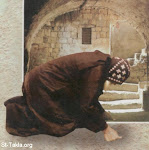Growing up as a second-generation immigrant isn't easy. Add in a religion and ingrained culture that seems to have polar opposite views as the new country you currently reside in doesn't help either.
When I was growing up, the decision of which view to assimilate into the American acceptability and which to maintain in the Egyptian propriety became one of the hardest hurdles to overcome. So, I did everything by the book. The Egyptian book. My second home was my church. Everything they said I took for gospel, regardless if they used the actual religious dogma or the old country's justifications to proclaim it was right . For example, I remember a Sunday school class when I was in elementary school that talked about dressing appropriately for church because it was the house of God--something that any Christian religion would advocate. When we reached our teen years, one teacher who was clearly new to the country told us to dress appropriately because if we didn't, we would cause the men in church to sin--an extreme Middle Eastern cultural view of the two sexes. She went on to say that men were the weaker sex and it was our job as women to make sure we dressed in a way that wouldn't tempt them to think sexual thoughts. If we did, then we were responsible for their sin and we would get punished for it--a more severe punishment than the man who performed the actual impure thought.
Apparently, this woman never got the memo that women have hormones and an imagination as well.
But I did as they asked because, hey, it was much easier to listen to one school of thought than two. You see, there weren't any websites like mine out there; those that tackled the identity crisis. Basically, there were two types of websites that discussed the Coptic community: those that alerted others to the persecution in the Middle East and those that enlightened others of the Coptic Orthodox beliefs. That was it. And for a while, I was fine with that. But then something changed. Something that made me see the "gray-area" light.
I went to college.
I saw all different types of cultures, beliefs, and daily practices from people who seemed undoubtably confident in what they were doing. I began debating what could I ease up on without going against my religion and the main positive aspects of Coptic culture. And so I created this blog.
It became clear to me that I needed to set a foundation of our roots before I got into the tangled mess of American and Coptic notions: roots like correcting the misconception that Copts are Arabs, that we come from the Church of the Martyrs, and the history behind our notorious cross tattoos. By doing that, I was then able to discuss whether we should get tattooed or not, my views on dancing, when it's appropriate to date. These are all problems we go through today.
I look forward to continuing this blog and addressing other issues that can help Coptic teens ease into the American society without feeling like they left their ethnicity back in the old country.
Sunday, December 13, 2009
Monday, December 7, 2009
When Hani Met Samia: The Difficulties of Dating in the Coptic Community
 Certainly one of most difficult elements of assimilation to endure is the relationship between men and women. To come from a country where there are so many taboos and rules of propriety involving the separation of boys and girls and moving to another country where it seems that anything goes is the ultimate definition of culture shock.
Certainly one of most difficult elements of assimilation to endure is the relationship between men and women. To come from a country where there are so many taboos and rules of propriety involving the separation of boys and girls and moving to another country where it seems that anything goes is the ultimate definition of culture shock.In America, the average teen starts dating when they are
 about sixteen years old—not including the “dating” that middle schoolers do that literally involves the bragging rights of calling someone their boyfriend/girlfriend while making dreamy looks at each other during class and hold hands during lunch—but actually going out on a date. The boy picks up the girl, probably after just getting his license the week before, and they go off alone. The locations may vary from the movies to dinner at a restaurant to a house party or school dance. Afterwards, it’s usually expected that there is a goodnight kiss involved if the date is a success and an “I’ll call you” promise to set up another time to go out.
about sixteen years old—not including the “dating” that middle schoolers do that literally involves the bragging rights of calling someone their boyfriend/girlfriend while making dreamy looks at each other during class and hold hands during lunch—but actually going out on a date. The boy picks up the girl, probably after just getting his license the week before, and they go off alone. The locations may vary from the movies to dinner at a restaurant to a house party or school dance. Afterwards, it’s usually expected that there is a goodnight kiss involved if the date is a success and an “I’ll call you” promise to set up another time to go out.In America, it’s typical to date several people when you’re in high school and keep your “options open.” Dating, for the most part, isn’t anything too serious; it’s not an engagement period for two people nor is it a sacred thing
 for most couples in the early stages. (Although that little girl doesn't look too happy that her boyfriend is playing the field, does she?) Each individual has their own standards of what physical activity is allowed and not allowed, which they usually describe by the commonly referenced baseball field analogy. Although there are variations of which base is equivalent to which activity, the commonly agreed bases deal with first being kissing and “home run” being sexual intercourse. Regardless of what your limits are, it’s become a rite of passage into adulthood to lose your virginity by prom night for many American teens.
for most couples in the early stages. (Although that little girl doesn't look too happy that her boyfriend is playing the field, does she?) Each individual has their own standards of what physical activity is allowed and not allowed, which they usually describe by the commonly referenced baseball field analogy. Although there are variations of which base is equivalent to which activity, the commonly agreed bases deal with first being kissing and “home run” being sexual intercourse. Regardless of what your limits are, it’s become a rite of passage into adulthood to lose your virginity by prom night for many American teens.In America, it’s much more common to hear about couples having a sexual relationship when
 they reach adulthood and to even live together before they agree to get married. Their entire opinion on sexuality changes drastically from the time of their first sex ed class to their first serious relationship and even beyond. Take, for example, the euphemisms “hooking up” and “messing around.” In high school, those phrases used to mean that two people were simply making-out. Once you reach college, those same phrases take on a completely different connotation. From now on, when you here that two people “hooked-up,” they didn’t just make-out; they had sex. What’s frightening is this: what changes is not the literal meaning of the words, but the person’s interpretation of sex. To “hook up” with someone while you’re in high school is not a big deal because you two didn’t have sex. And when you “hook up” with someone in college, it isn’t a big deal either because one-night stands are simply part of the college experience for many Americans.
they reach adulthood and to even live together before they agree to get married. Their entire opinion on sexuality changes drastically from the time of their first sex ed class to their first serious relationship and even beyond. Take, for example, the euphemisms “hooking up” and “messing around.” In high school, those phrases used to mean that two people were simply making-out. Once you reach college, those same phrases take on a completely different connotation. From now on, when you here that two people “hooked-up,” they didn’t just make-out; they had sex. What’s frightening is this: what changes is not the literal meaning of the words, but the person’s interpretation of sex. To “hook up” with someone while you’re in high school is not a big deal because you two didn’t have sex. And when you “hook up” with someone in college, it isn’t a big deal either because one-night stands are simply part of the college experience for many Americans.And while the country is dealing with a 50% divorce rate, you have to wonder if it is their flexible views on dating and sex that has a hand in it.
Egypt, on the other hand, is quite different. A friend said it best when, during his father’s eulogy, he stated: “at forty, after three Master’s degrees, he decided it was time to get married. So he went to Egypt and a week later he was married.” Not dated, not engaged, but married. There’s no concept of dating in Egypt. In fact, your contact with most people of the opposite sex by the time you hit puberty is cut dramatically. Long gone are the days where you could
 play with everyone, like this boy and girl photographed on the left, and not have a major gossip column dedicated to your personal life. It’s as if the elders smelled the hormones bubbling and decided to take action before your reputation became tainted.
play with everyone, like this boy and girl photographed on the left, and not have a major gossip column dedicated to your personal life. It’s as if the elders smelled the hormones bubbling and decided to take action before your reputation became tainted.During the liturgy or any church service, regardless of the continent it’s on, men and women are separated (usually men sit on the left side of the church and women sit on the right). Even when taking Communion, they go to separate sides of the altar. In social outings, a girl cannot sit alone with a boy and vice versa—they’re always within a group regardless if those two are best friends. And if there’s a moment when those of the opposite sex are at a home and they’re not related, there’s always a chaperone of sorts lurking around the corner. Actually most won’t lurk; they openly sit and watch so as not to give these two people the option to give into temptation—even though they may not be each other’s type. You may be laughing, but I’ve experienced this personally on several occasions.
In Egypt, it’s very common to hear about a boy and girl getting engage shortly after they've
 met—and most importantly, after their parents have met and discussed the prospects of their children marrying. Once they are engaged, then they can start going out in public and sitting by themselves, etc. However, the sexual nature of dating is not even in Egyptians’ vocabulary. It’s just not something they do until they get married. And those who are rebellious enough to date like the Americans or Europeans do so secretly.
met—and most importantly, after their parents have met and discussed the prospects of their children marrying. Once they are engaged, then they can start going out in public and sitting by themselves, etc. However, the sexual nature of dating is not even in Egyptians’ vocabulary. It’s just not something they do until they get married. And those who are rebellious enough to date like the Americans or Europeans do so secretly.So where does that leave those Copts who straddle the Atlantic threshold? Do they date the American way or abstain the Egyptian way? We Diaspora Copts who were born in America or moved here at a younger age know three sure-fire ways to give our parents a conniption by becoming consensual partners-in-crime to some of the major cultural taboos within the underground dating scene.
The first: coming out. It’s one thing to date undercover. It’s another thing entirely when you’re dating someone who shares the same gender that you do. To be gay in the Coptic/Egyptian community is a major no-no for both religious and cultural reasons and will definitely have your parents dragging you by your black hair to the priest’s house to exercise the gayness out of you until you are on the straight and narrow path of heterosexuality.
The second: the Muslim lover. Parents and Church elders look at this interreligious coupling as if a Holocaust survivor started dating a Nazi solider. It is completely unacceptable not only because of the major religious differences, but also because of the clashes between the two in the motherland. The whole reason we are here and not back “home” is because of how Christians are treated by the Muslim inhabitants. Many who are in these types of relationships give the excuse that their Muslim counterpart could always convert, since the Church only recognizes marriages between two Coptic Orthodox believers. But let’s be realistic: how many of us actually marry our high school sweetheart? With that in mind, is it really worth it the secrets and the fighting? You decide.
The third: going black. Dating an African-American has been the cause of fights between all Coptic girls and their parents. We can’t help it. Stereotypically, black men prefer women with
 wide hips and thighs… and let’s face it, ladies, we like men who appreciate our assets. However, parents disagree with their girls getting romantic with the naturally tanner men because “their culture is different,” even though we both come from the same continent. But have no fear, my dear girls: out of these three taboos, this is the one that will most likely be accepted with the right guy, good timing, and your persistence.
wide hips and thighs… and let’s face it, ladies, we like men who appreciate our assets. However, parents disagree with their girls getting romantic with the naturally tanner men because “their culture is different,” even though we both come from the same continent. But have no fear, my dear girls: out of these three taboos, this is the one that will most likely be accepted with the right guy, good timing, and your persistence.But like I said, I already knew all of that. And the fact of the matter is, when we are ready to get married, most of us combine the American and Egyptian way. We’ll date someone for at least a year or two before we get engaged, but sex is not an option until the wedding night.
However, one of the hot button issues is dating in high school. I wanted to find out what’s going on in the minds of Coptic teenagers nowadays; so, once again, I took a poll at St. Mark’s Coptic Orthodox Church of Washington, DC and asked their high school group and college freshmen a few questions about dating at their age.
My first question dealt with this growing phenomenon of “talking” among the high school. When confronted with interrogations if they are dating someone, many will deny it and say variations of “No, we’re not dating, we’re ‘talking.’” So what is “talking” exactly?
· “Well, if this means that they aren’t dating but they “like” each other, then it’s talking a great
 amount (at all hours of the day) and/or at late hours. We like to deny that we are actually ‘dating’ because it’s frowned upon, but in reality, that’s what is happening when two people are ‘talking’ in that way. Also....certain things are said that wouldn’t be said to any other person.” M—, age 16, Copt.
amount (at all hours of the day) and/or at late hours. We like to deny that we are actually ‘dating’ because it’s frowned upon, but in reality, that’s what is happening when two people are ‘talking’ in that way. Also....certain things are said that wouldn’t be said to any other person.” M—, age 16, Copt.· “Talking can be used to mean a few different things: 1) It's like dating without the title. Having the title can bring on complications. 2) The term that covers flirting without the promiscuous feel put on display. 3) A way to be involved in the feel of having a significant other without the commitment. 4) ‘practice dating.’” S—, age 15, Copt
When asked about their views on dating at their age, I found polar opposite responses. About half were okay with dating, saying there’s nothing wrong with it, while others found dating in high school to be immoral and illogical:
· “I want to date when I want to find love and I want to find love when I want to get married, I am not getting married at 16. Dating [in high school] is frivolous and hazardous. Sure everyone wants the kind of attention one receives in a relationship, but it’s bound to end if you enter the dating world too soon. When a relationship ends it usually causes emotional pain that one begins to associate with having a boyfriend/girlfriend and looks for another person to fill this void. It is like a drug.” Germeen, age 16, Copt.
· “My parents have expressed the importance of getting an excellent education. They have no problem with me commenting that XYZ is hot, but that's as far as it goes. ‘You have one chance on education right now, and a million for boys when you're done, stay focused.’” S—, age 15, Copt.
· “Well, I don’t think it's wrong. I mean, I understand why everyone was saying don’t date in high school...but the older you get, your views change and start seeing things that you didn't pay attention to before!” Miriam, age 18, Copt.
· “My views on dating are that it is completely acceptable to date within a pure and God-centered context. It is a chance for two individuals to learn to grow independently, but also with one another to find if a long-term relationship is possible. I do not believe that dating should be simply casual (though it should be enjoyable); I believe that dating should be with the intent to find someone compatible for you, and someone from God that will walk with you lovingly, emotionally, and spiritually for the rest of your life. There needs to be an aspect of vulnerability in the relationship, but boundaries are necessary. Those in a dating relationship are to prepare themselves to be husbands/wives, but not be ‘practicing’ or acting as if a married couple would.” Mary, age 20, Coptic American.
Very few have admitted to a moderate belief in the positives and negatives of dating in high school; however, they have personally chosen to abstain from dating until they are older. Those who have decided to date had their first date when they were about sixteen or seventeen. One person admitted to having his when he was twelve while the other waited until she was nineteen.
 And of course, every individual draws a line at what is acceptable and unacceptable behavior. Less than one percent of those who were polled admitted to having been sexually active. A couple individuals discussed how everything except oral sex and sexual intercourse were fine, while you are in a relationship. Others drew the line at several different places:
And of course, every individual draws a line at what is acceptable and unacceptable behavior. Less than one percent of those who were polled admitted to having been sexually active. A couple individuals discussed how everything except oral sex and sexual intercourse were fine, while you are in a relationship. Others drew the line at several different places:· “Personally, I think that if you do decide to date in high school, like, there is nothing wrong with kissing. But the making out and PDA and just nastiness pisses me off. Just a little kiss and holding hands are not that bad.” Yordi, age 16, Ethopian-Coptic-American

· “I think the line should be drawn after hugging or holding hands because then you can't really control yourself sometimes and one thing will lead to another.” Miriam, age 18, Copt.
· “Since [I began] dating, it has been a tension to establish boundaries. I prefer not to use the word ‘allowed,’ but rather, what is ‘appropriate.’ Much of that comes from the idea of 1 Corinthians 6:12 that ‘everything is permissible for me— but not everything is beneficial. Everything is permissible for me—but I will not be mastered by anything.’ Making ‘rules’ is not the same as setting boundaries. For me and my boyfriend, we have decided that holding hands is appropriate and light kissing, but avoiding making out. We decided this because these are the ways we wanted to show affection, without causing each other to stumble. Although we have set boundaries, we have found that it is absolutely essential to continue defining our boundaries based on the changes we go through as a couple, and redefining places where we have made mistakes, etc.” Mary, age 20, Coptic American.
 Although the lines of propriety and views on dating may vary, they all have one thing in common: parents who did it the “Egyptian way.” Those who decided to hide their past and present relationships from their parents justify their actions by saying their parents are “old-fashioned” or “close-minded.” One said: [My mom] would get mad and start yelling and then she would go all Christian on me and tell everyone and make me break up with her.” K—, age 14, Copt. They have a complex that, because their parents are Egyptians who’ve done everything by the old-country’s standards, their children need abide by those standards as well. If they find out, there will be hell to pay. There will be beatings involving the notorious flip-flop, forced break-ups, and a lack of trust that will probably follow them until they’re thirty.
Although the lines of propriety and views on dating may vary, they all have one thing in common: parents who did it the “Egyptian way.” Those who decided to hide their past and present relationships from their parents justify their actions by saying their parents are “old-fashioned” or “close-minded.” One said: [My mom] would get mad and start yelling and then she would go all Christian on me and tell everyone and make me break up with her.” K—, age 14, Copt. They have a complex that, because their parents are Egyptians who’ve done everything by the old-country’s standards, their children need abide by those standards as well. If they find out, there will be hell to pay. There will be beatings involving the notorious flip-flop, forced break-ups, and a lack of trust that will probably follow them until they’re thirty.A view that was also expressed included how their high school servants and elders treat them in their dealings with the opposite sex. Anonymity will be used for this section of quotes. Church servants, if you’re reading this, pay attention:
· “I would like to change the perspective of the older people because, especially in out high school ministry, a lot of the servants are very strict with boys and girls and we all heard about the ‘lost generation’ of Copts but this time we are different and we want the servants to kinda not be so strict. Even talking to a boy makes them suspicious.”

· “Oh my goodness! The fact that guys and girls get yelled at if they hug each other. Even if the girl is older, they freak out and think they’re like having sex or something!”
· “Parents and kids need to have a means of understanding one another, and high school outings [need to] lighten up on the severity and strictness.”
· “[High school servants need] to be more relaxed about dating ‘cause no matter what, we're gonna do it behind your back.”
So what do parents and church servants do when they hear something like that: “no matter what, we’re gonna do it behind your back.” Parents try to enforce and beg that their children do it their way; Church servants try to enforce the ideal time to date is when you are “spiritually, mentally, and financially” ready. But is there really anything you can say when someone’s mind is already made up? Maybe the best we can do is give them our opinion and let them learn through experience if dating in high school is really worth it.
The best way to sum up the difference between beliefs and actions of the Second-Generation, Diaspora Copts is through a quote by seventeen year old Mariam. She states: “I have dated before and found no point for it at the end, and I won’t be surprised if I dated again even though I know all of this. And if you ask me why I would date again, I think my answer would be that I can't help it.”
Labels:
assimilation,
coptic orthodox,
coptic teens,
copts,
dating,
egyptian
Subscribe to:
Posts (Atom)










